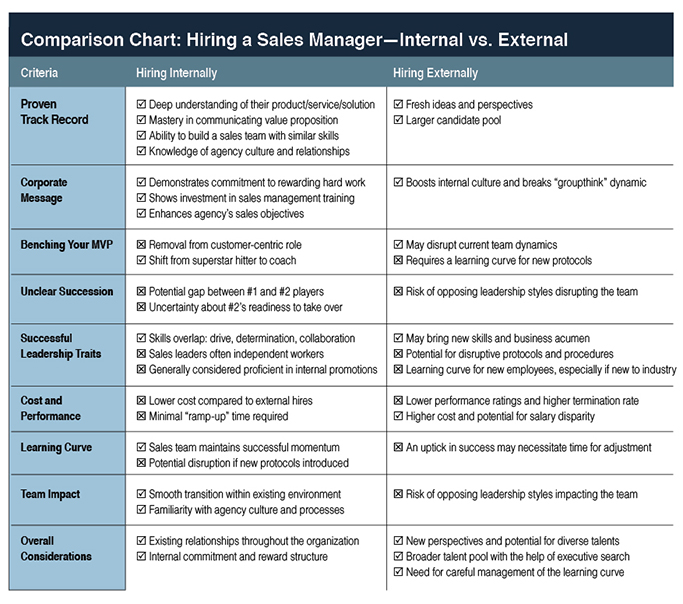
Is it a great idea or a pitfall?
While promoting the top producer to a leadership position
might seem obvious, it is essential to consider
the broader skills required for successful management.
By Carolyn Smith, APR, TRA
In many agencies, a common practice is to promote the top producer from within to a managerial role, assuming that sales success equates to management success. However, recent calls to Beyond Insurance challenge this assumption.
Consider the case of Carla, a stellar producer promoted to a managerial position. Initially, the decision seemed logical—a reward for outstanding performance and an opportunity to inspire the team. Yet, reality struck a year later when Carla, who did not have stellar management skills and was denied requests to return to her previous position, departed for a competitor, who offered her what she wanted, leaving behind a struggling team.
Another example involves James, a top producer turned sales manager. With two new producers under his wing demanding substantial attention, James finds himself torn between mentoring his team and maintaining his own client base. The overwhelming demands of management have led James to contemplate abandoning the managerial role entirely and returning to his previous producer role.
These instances highlight the consequences of unquestioningly promoting top producers to managerial positions and underscore the importance of evaluating managerial potential beyond sales achievements.
While past performance is often deemed a reliable predictor of future success, it can be misleading. Examining sales reports and achievements may indicate success in a specific role. Still, it doesn’t provide insights into the methods employed or whether the individual possesses the skills necessary for a different position. Success in one role does not guarantee success in another.
Challenges faced
While many exceptional sales producers transition seamlessly into management, challenges often arise when a super-producer with a large book of business is promoted to a managerial role:
- Reluctance to let go. Some struggle to relinquish their previous role, which can interfere with customer relationships and deal closures, undermine team motivation, and weaken customer connections.
- Results-only management. Expecting the team to replicate their individual success, these managers may lack coaching skills and constructive feedback, thus hindering the growth of their team members.
- Administrative avoidance. Frustration with administrative tasks can lead to neglected essential responsibilities that impact overall team performance.
The domino effect on team dynamics
The team’s learning and growth can stagnate when these challenges persist, leading to disenchantment and disengagement. Eventually, producers may leave, putting the entire agency’s performance at risk.
Sales managers are not meant to be super-salespeople as they operate one step removed from direct client interactions. Despite this, many new sales managers find playing the “watch and do what I do” game tempting, especially if they were once successful salespeople. However, this approach hinders producers from having valuable learning opportunities. Insisting on selling as a sales manager is akin to a coach insisting on being a player. To reward someone for excellent performance, change their title rather than their job responsibilities.
So, what skills should a sales manager exhibit?
- Motivation and tools to thrive. Effective sales management transcends mere number-crunching; it involves fostering meaningful connections with clients and the individual producer team members, motivating through empowerment, and equipping each team member with the necessary tools and guidance to thrive in their environment.
- Focus on continuous growth. A proficient sales manager appreciates the complexities of human interaction, adeptly navigating challenges while focusing on continuous growth and accountability. This necessitates sharp perception to identify individual talents and areas for development, coupled with the ability to translate aspirations into actionable goals that align with capabilities.
- Intellectual demands and challenges. Besides enduring the challenge of letting producers “live in the field,” effective sales managers must handle more details, identify individual strengths and weaknesses, and keep track of diverse client statuses. The intellectual demands of management surpass those of individual contributors, becoming more intense and abstract as individuals move into management roles.
- Managerial and coaching responsibilities. Sales managers must evolve from persuasive sellers to adept questioners and fact-finders. Many struggle with this transition, as the inclination to “tell” rather than “ask” prevails. Coaching skills are crucial in sales management. A manager who cannot adapt to the occasion and accommodate subordinates will likely be ineffective.
- Organizational skills and personal preferences. Sales managers must be naturally organized without being overbearing or micro-managing, dealing with the challenge of managing individuals who resist being managed or developed. The transition from being recognized as a successful producer with a strong book of business to standing behind the curtain as a sales manager requires a person who enjoys indirect action, as managerial titles often lack the immediate rewards and recognition associated with sales roles.
- Understanding attitudes, interests, and motivations. While having the necessary intellectual, planning, and coaching skills, a successful sales manager must also genuinely enjoy the role. Those seeking immediate feedback, personal rewards, and direct action often make better producers than managers. Individuals aspiring to management positions for prestige rather than responsibility can be potential management disasters.
 Hiring externally vs. promoting internally
Hiring externally vs. promoting internally
Karolina Stefko, a recruiter from Talent Forte who has more than 10 years’ experience in finding talent in the insurance and risk management industry, explains the pros and cons of hiring externally vs. promoting internally (additional information from Stefko and Dr. Chris Croner from SalesDrive can be found in the chart
- Retention. Hiring externally can lead to internal cleanup due to previously unobserved poor habits, potentially resulting in higher turnover rates.
- Cost. Opting to give an existing employee a salary increase and promotion can be a cost-effective alternative to hiring new talent.
- Turnaround time. Managers who are promoted internally typically ramp up faster than a new external hire because the new hire would need to learn the team dynamic and culture.
- Brand. Employees are more likely to be attracted to a company brand that values hard work and offers opportunities for promotion, enhancing the company’s reputation.
- Introducing new talent with less knowledge and ingrained bad habits may lead to issues among the established team members, including productivity loss, dips in team morale, and disruption of projects.
- Skilled talent loss. Be selective when promoting internally in order to avoid alienating high-functioning employees. Ensure that your decision is carefully considered and be prepared to discuss the promotion process with top performers who were not selected.
Stefko adds, “Great leaders are not the best at everything. They find people who are the best at different things and get them all on the same team. It’s all about how you collaborate, adapt, and grow together to achieve efficacious results.”
Essentially, finding a good sales manager for your producer team is both a science and an art:
Successful sales do not automatically translate to effective management; they never have, don’t, and never will. Managers should know how to sell, not necessarily be the best at selling.
- Successfully navigating sales management challenges requires a thoughtful approach, recognizing the nuanced skills and attitudes necessary for the role.
- Seek an expert to evaluate future management candidates; it pays for itself with the first successful promotion.
Agency leaders should prioritize the individual’s ability to meet the unique needs of the agency, its goals, the existing team, and the culture. To make the best decision, understanding the pros and cons of hiring vs. promoting a sales manager is critical.
While promoting the top producer to a leadership position might seem obvious, it is essential to consider the broader skills required for successful management. Recognizing and addressing potential pitfalls proactively ensures a smoother transition and fosters a positive and effective sales leadership environment.

The author
Carolyn Smith, APR, TRA, chief training officer for Beyond Insurance, creates and delivers transformative programs, including the Trusted Risk Advisor certification, BIGN Producer Boot Camp, and Quest for Success, that have positively impacted the lives and careers of countless professionals. These programs help industry professionals build a career that they love and achieve the success they deserve.




